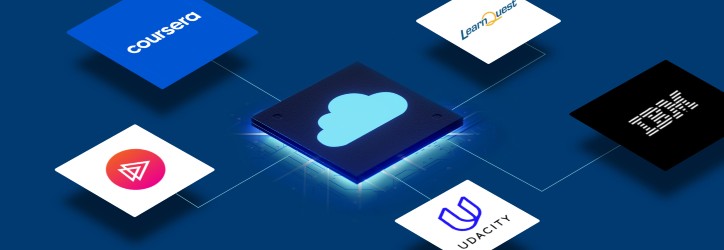Cloud computing in recent years has largely replaced traditional computer products with internet-delivered services, such as remote data storage. But the growth of the public cloud services market is nowhere near done. That means the need for qualified cloud computing experts is exponential.
This billion-dollar market is projected to grow 20.4% in 2024, totaling $678.8 billion — up from $563.6 billion the year prior.
Employees hired for these generally high-paying tech roles must be well-versed in Amazon Web Services, the most widely used computing platform worldwide. AWS offers a number of certifications, such as AWS Cloud Practitioner, AWS Certified Solutions Architect, AWS Certified Developer and more.
A common question is whether you can get a job with just AWS certification. The honest answer: No single certification comes with a guarantee. Keep reading to learn what other opportunities you should pursue to stand out in a competitive applicant pool.
Strategizing Your AWS Certification Journey: Which Certifications Should You Pursue?
With a vast array of AWS certifications to choose from, it’s important to strategize which to pursue. Consider the following during the decision-making process:
- Align certifications with your career goals
- Balance the number of certifications with practical experience
- Focus on gaining hands-on skills alongside certifications
- Continue learning and stay up-to-date on skills
While accumulating multiple certifications can demonstrate a broad knowledge base, it’s equally important to balance them with practical, hands-on experience. AWS certifications are highly regarded, but employers also value real-world experience. Here’s how you can strike this balance:
- Start with Foundational Certifications: Begin with certifications like AWS Certified Cloud Practitioner to build a solid understanding of AWS fundamentals.
- Progress to Specialty and Professional Certifications: Once you have foundational knowledge and some practical experience, move on to more advanced certifications that align with your career goals.
- Apply Your Knowledge: Seek opportunities to work on AWS projects, whether through your current job, internships or personal projects. Real-world application of your skills will solidify your knowledge and make you a more attractive candidate to employers.
The AWS Certification Landscape: An Overview of Available Certifications
Below is an overview of some of the AWS certifications available. A complete list can be found here.
| Certificate | Level | Goal |
| AWS Cloud Practitioner | Beginner | A basic understanding of AWS Cloud concepts, services and terminology. |
| AWS Certified Solutions Architect (Associate) | Intermediate | Focus on designing AWS-based architectures |
| AWS Certified Developer (Associate) | Intermediate | Developing and maintaining AWS applications |
| AWS Certified DevOps Engineer | Professional (Intended for individuals with at least two years of experience) | Showcase technical expertise in provisioning, operating and managing distributed application systems. |
| AWS Certified Advanced Networking | Specialty (Intended for individuals with at least five years of experience) | Validate expertise in designing and maintaining network architecture for a wide range of AWS services. |
Landing an AWS Job: Beyond the Certifications
AWS certifications alone may not be enough to secure a job in the field. Education, experience and networking are also essential. Here are some ways to differentiate yourself in the job market by pursuing additional qualifications and showcasing your problem-solving skills:
Education
- Consider pursuing higher education in cloud computing or related fields. USD offers a 100% online Master of Science in Applied Artificial Intelligence degree, providing the opportunity to gain advanced skills and knowledge, as well as hands-on experience.
Hard and soft skills
- Hard skills include acquiring complementary training and certifications (for example, Azure and Google Cloud), programming, scripting and managing cloud infrastructure.
- Soft skills such as strong communication, attention to detail, problem solving and adaptability.
Practical experience
- Gain experience through internships, co-ops or personal projects, which will help demonstrate analytical abilities and persistence.
Networking and professional development
- Build connections and stay updated on industry trends
Top Roles for AWS-Certified Job Seekers
Below are some common job titles in the cloud computing market:
| Job Title | Description | Average Annual Salary |
| Solutions Architect | Designing and implementing ASW-based infrastructure solutions | $148,000-$158,000 |
| Developer | Developing, deploying and maintaining applications in the AWS platform | $132,000 |
| Systems Operations Administrator | Managing and monitoring AWS systems and infrastructure | $97,000-$107,000 |
| Security Specialist | Ensuring data protection and compliance with security best practices | $132,000-$152,000 |
Use this guide as a tool as you continue your career search. Remember that AWS certifications are valuable, but there are complementary qualifications that also carry weight in the process. When it comes to deciding on a Data Science master’s program to pursue, USD offers a free eBook, ” available now.
As you prepare for your next steps, download our checklist for selecting a master’s program, 7 Questions to Ask Before Selecting an Applied Data Science Master’s Degree Program. The path to becoming a BI developer is at your fingertips. Get started today!





